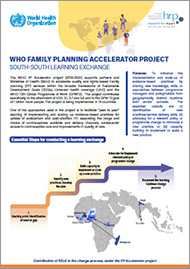The World Health Organization (WHO) was a member of the Core Organizing Group of the sixth International Conference on Family Planning (ICFP), held in Thailand from 14-17 November 2022.
ICFP is the world’s largest scientific conference on family planning and reproductive health and ICFP 2022 was the first in-person meeting since 2018.
Across an inspiring, challenging, ambitious week, here are a few highlights:
Strengthening partnerships:
WHO led and participated in nearly 50 events with partners, celebrating collaborations at the global, regional and country level.
From pre-conference sessions on implementation, adolescent health, the demographic dividend and digital health, to dynamic panels on COVID-19 and SRH services, learning from failure and learning from each other – including the Family Planning Accelerator Project’s South-South exchange – partnership is a constant key to advancing family planning advocacy, policy, financing, and programming globally.
Dr Pascale Allotey announced WHO’s strengthened partnership with FP2030. Learn more about the Memorandum of Understanding and commitments prioritizing research, evidence and innovation to improve access, quality and uptake of contraceptive services in her dynamic conversation with Dr Samukeliso Dube on the ICFP Live stage.
Updating global family planning guidance:
We released important updates to the WHO Family Planning Handbook, the most widely used reference guide in the world for health workers and policy makers to access information on contraceptive options.
WHO’s evidence-based recommendations, guidance and tools are critical for helping countries achieve universal access to sexual health and reproductive health and rights. Attendees picked up WHO technical resources on self-care, law and policy recommendations for abortion care, and social accountability interventions.
Delegates also learned more about WHO’s work with partners on sexual wellbeing – and why SRHR programmes should incorporate sexual pleasure.
Listening and learning, local to global:
Understanding local priorities, listening to community experiences and learning from their expertise is critical for global change.
The IBP Network, a civil society platform hosted at WHO, led a full programme track at ICFP 2022 with activities in English, French and Spanish. Sessions centered on the expertise of diverse stakeholders including young people, grassroots organizations, and implementers at country and community level, to ground family planning implementation in sound research, evidence and innovation.
WHO’s scientific writing, mentoring and coaching programme, which ran across the conference, was another intimate and immediate opportunity for delegates to share and advance their own research.
Celebrating SRH stories on film:
WHO’s annual Health for All Film Festival (HAFF) shows how powerful films can be in raising awareness, improving understanding and encouraging positive behaviour change.
This year WHO is offering a special SRH Film Prize, in celebration of the 50th anniversary of the UNDP-UNFPA-UNICEF-WHO-World Bank Special Programme of Research Training in Human Reproduction (HRP).
At ICFP we put out the call for submissions and encouraged the global family planning community – public institutions, NGOs, health professionals, scientists, students – to think creatively about SRHR. Decisions about fertility and reproduction are deeply personal, and there are so many stories to tell.
The deadline is 31 January, application details here.
Working with parliamentarians:
WHO partnered with the European Parliamentary Forum for SRHR (EPF) and UNFPA to convene a Parliamentary Forum at ICFP 2022, hosted by the Global Parliamentary Alliance for Health, Rights and Development (GPA).
Parliamentarians are increasingly playing key roles in efforts to strengthen family planning through national budgets, holding governments accountable for their commitments, and advocating to positively shift social norms and attitudes around SRHR. Over the last few years, WHO has intensified its engagement with parliaments on key priorities of universal health coverage, global health security, and health promotion, especially for women, children and adolescents.
Parliamentarians from nearly 20 countries gathered in Pattaya City to exchange on strategic priorities and strategies to support expanding access to family planning, particularly sustainable financing.
Leading the call for SRHR and UHC:
Universal access to sexual and reproductive health services is a human right, and there is no universal health coverage without integration of sexual and reproductive health services. At the opening ceremony, Dr Tedros Adhanom Ghebreyesus, WHO Director-General, made this message clear.
“Quality family planning and reproductive health and rights are essential components of universal health coverage and primary healthcare,” he said. “Family planning is also key to many development aims including education, food security, economic prosperity and even climate change.”
Integrating SRHR in UHC will take both practical strategies and political commitment. WHO is leading technical work to help decision-makers, programme managers, implementers, civil society, researchers, and wider health systems communities.

